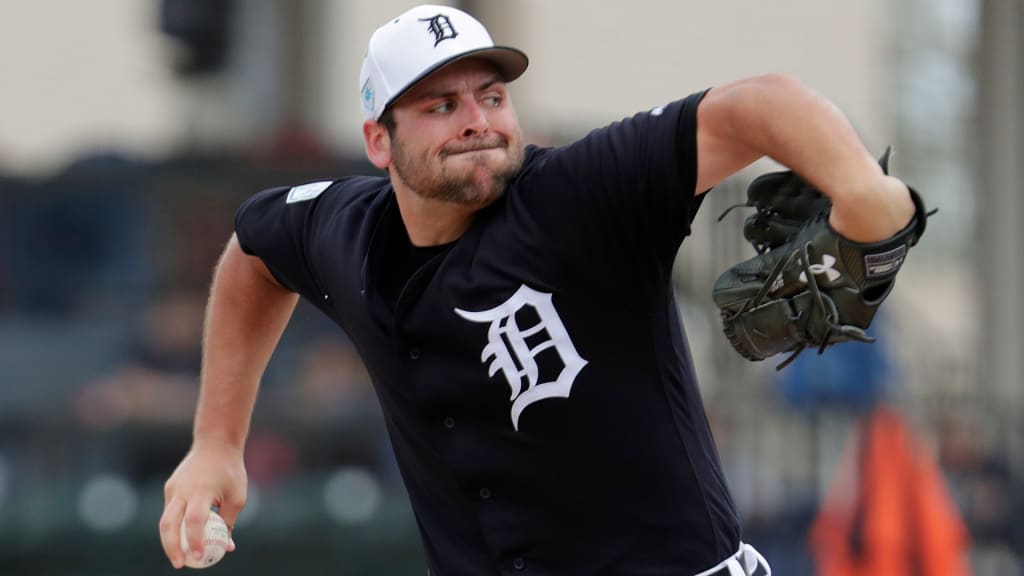
LAKELAND, Fla. -- Michael Fulmer spent an entire offseason rehabbing his right knee to get ready for Opening Day. The Tigers right-hander is now looking at a year of rehabbing his right elbow.
“When I heard the news, it was like a punch to the gut,” Fulmer said Wednesday morning after confirming he’ll undergo Tommy John surgery to repair the ulnar collateral ligament in his elbow.
The surgery is expected to sideline Fulmer for the entire 2019 season and likely the start of the '20 campaign.
A third opinion confirmed the recommendation of Dr. James Andrews. Fulmer, 26, has not yet scheduled the surgery or picked the surgeon. Dr. Andrews performed surgery to reposition the ulnar nerve in his elbow in 2017, as well as surgery last fall to repair torn meniscus in his right knee.
In an odd way, the previous surgeries appear to have contributed to the one he’s facing now.
Questions about Fulmer’s health began after he showed a velocity drop in his Spring Training outings. His fastball, normally in the mid-to-upper 90s when he’s healthy, was down to 89-91 mph in his last outing on March 9 against the Braves. Fulmer cited a lack of explosiveness in his lower body as a reason.
Fulmer had been rehabbing his knee after being shut down from game action to work on his lower-body mechanics. He threw a bullpen session Friday in front of club officials.
“That’s one of the things that I was proud about, that my shoulder and arm felt great,” he said. “I mean, the reason we stopped throwing in games was to work on my lower-body mechanics, and we kind of found it, and I don’t know what happened. [The elbow] just kind of felt tight, and I felt a little pain after my bullpen in some spots that I’d never felt before. So we just went ahead and got it checked out. Thought it was some tendinitis, but obviously my MRI showed some more.”
Fulmer said Friday he shut down from game action because he worried about overthrowing or putting too much pressure on the arm to try to get velocity back. This was precisely the scenario he feared.
“The whole velocity drop was straight from lower body,” he said. “It wasn’t from my arm. I’m telling you guys, the health of my arm was fantastic. That’s why I never worried about velocity, because I knew once I got my power back in my legs and the explosiveness back in my legs, the velocity would come. But now … it’s just tough, tough to think about. I just think about the whole year going forward and just hope to return the best I can next year.”
An MRI exam on Monday led to recommendation of surgery from team doctors, later confirmed by Dr. Andrews. But the explanation Fulmer was given suggested the damage had been building for a year or more since the surgery to shift his nerve and alleviate the numbness and discomfort that bothered him in 2017.
“Basically they were telling me that my [ulnar collateral ligament was] getting deteriorated from all the scar tissue that’s built up from my ulnar nerve surgery and my bone spur surgery back in 2014,” Fulmer said. “I mean, every pitcher has damage to their UCL in some way, shape or form, but they’re saying mine was being held together by scar tissue, and that it was cementing the UCL in place where the attachment is. So basically they said it could’ve gone at any time.
“All I know is how I felt before, and it felt great. Just one bullpen later, that’s how fast things can change.”
Fulmer consulted with a third specialist just in case, hoping to hear an alternative to surgery. He also talked to pitchers who have had the surgery, from teammate Matt Moore to high-school friend and Orioles pitcher Dylan Bundy.
“Before I even asked [Bundy] if I should or not, he goes, ‘Don’t try to rehab it,’” Fulmer said. “He tried to rehab it for five months, basically lost five months of his career. He said to go ahead and get it fixed. Afterwards, he said he never thought his elbow could feel that good throwing.
“That’s the exciting part about it, that just from guys that have had it done, they said they felt so much better afterwards when they came back.”
That’s what Fulmer is seeking, a return to the way he felt when he won American League Rookie of the Year honors in 2016. That was a healthy season following bone spur surgery in 2014 and knee surgery before that. Since that 2016 campaign that saw Fulmer win 11 games with a 3.06 ERA and a shutout, Fulmer has faced surgery every year since.
To that end, he plans to keep strengthening his knee while he rehabs his elbow.
“I don’t think there’s a time when I was 100 percent last year,” Fulmer said. “Coming off that nerve surgery the first half of the season, still experienced some symptoms here and there. And then obviously after that was the knee. So I think that I can easily get back to 2016 form, 2017 form stuff-wise and hopefully results-wise too.”
